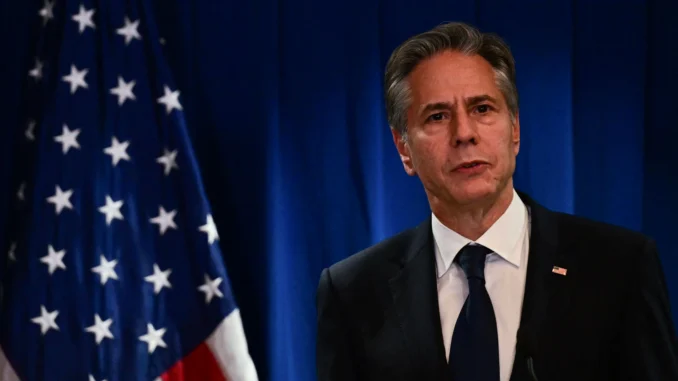
WASHINGTON – Secretary of State Antony Blinken raised eyebrows Monday, telling reporters the US “does not support Taiwan independence” after meeting in Beijing with officials including Chinese President Xi Jinping.
Blinken’s statement ruffled the feathers of many Republicans in Congress, who viewed the statement – and the secretary’s inability to re-establish military-to-military communications – as an inappropriate kowtow to America’s greatest adversary.
“Blinken flew to Communist China to appease Xi Jinping and state the Biden administration does not support Taiwan’s independence,” Sen. Marsha Blackburn (R-Tenn.) said on Twitter. “Why won’t this administration stand up to bullies and stand for freedom?”
The Taiwan issue is among the most contentious in the US-China relationship, with Xi making it his No. 1 priority to “reunite” Taiwan with China — though the island about 100 miles off the country’s southeastern coast has never actually been part of it.
Rep. Ben Cline (R-Va.) tweeted that Blinken’s statement was a “dangerous display of weakness towards our adversaries on the world stage.”
“The Biden admin is giving China a green light to increase its intimidation of our ally, Taiwan,” he said.
However, Taiwan is not a formal ally of the United States – though the Biden administration has repeatedly said the US would come to the self-governed democratic island’s defense if China were to attack.
Instead, the US adheres to a so-called “One China policy,” which does not take a formal position on the status of Taiwan’s sovereignty.
What is the One China policy?
Washington’s “One China policy,” which has been critical for maintaining peace in East Asia since it took effect in the late 1970s, holds that the US acknowledges – but does not necessarily agree with – Beijing’s opinion that Taiwan is its sovereign territory.
Instead, the policy holds that the US considers Taiwan’s sovereignty status unsettled, and successive presidential administrations have held that the US favors no change to the “status quo” of relations between China and Taiwan.
However, the US also allows for its military to come to Taiwan’s defense should Beijing attempt to take Taiwan by force, something both the Trump and Biden administrations stated repeatedly as US-China tensions began heating up in 2016.

What is China’s position?
Unlike the US’ One China policy, Beijing adheres to its “One China principle.”
Though the names sounds similar, there is one important difference: The One China principle holds that there is only one nation of China, and Taiwan is part of it.
While it may seem like an idiosyncrasy, the Chinese principle takes a firm position on the island’s status, unlike the US’ policy.
Beijing believes in “one country, two systems,” meaning that Taiwan and other China-claimed self-governed areas may have a separate system of government, but are still part of China.

China regularly claims the US has violated the One China principle – while failing to mention the important differences between the American policy and Chinese principle.
Is Blinken’s position on Taiwan new?
The US has never formally supported Taiwan’s independence, so Blinken’s comments are not a surprise to those who closely follow Washington-Beijing relations.
While Beijing alleges that the United States supports the island’s independence with each senior official that visits Taipei, Washington holds that the current ambiguity in Taiwan-China relations should be maintained.
However, the One China policy continues to evolve with the competition between China and the US.

Will the US come to Taiwan’s defense?
Even though the United States – through its One China policy – believes in maintaining the status quo, the federal Taiwan Relations Act of 1979 holds that the US will come to Taipei’s aid should China use military intervention to force the island into submission.
“We remain opposed to any unilateral changes to the status quo by either side,” Blinken said. “We remain committed to continuing our responsibilities under the Taiwan Relations Act including making sure Taiwan has the ability to defend itself.”
o that end, Congress has been pushing the Pentagon to prioritize sending Taiwan military aid ahead of any potential conflict.
Defense Secretary Lloyd Austin last month said the Pentagon is working to supply the island with weapons using part of the $1 billion lawmakers earmarked last year to be spent on defense systems for Taipei’s military.
Still, the weapons packages are meant to act as a deterrent to prevent China from attacking Taiwan, as Blinken said the US “continue[s] to expect the peaceful resolution of cross [Taiwan] Strait differences.”
What could be next?
Members of the bipartisan House Select Subcommittee on Countering the Chinese Communist Party last month issued a “ten for Taiwan” report laying out policy strategies lawmakers should consider to push back against China.
In part, it says that the US should pass legislation that would state its official position in a more straight-forward manner.
“[T]he United States, alongside its allies and partners, should publicly oppose any attempts by the CCP to resolve the status of Taiwan’s sovereignty by intentionally misusing, misinterpreting, and misleading others on the underlying purpose of … the United States’ One China Policy,” the subcommittee said in its report.
“The United States and its allies need to strengthen and better coordinate collective planning for how they will deter or would respond diplomatically and economically to a crisis over Taiwan.”



